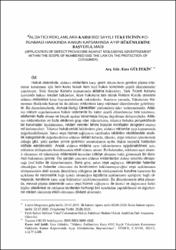Aldatıcı Reklamlara Karşı 6502 Sayılı Tüketicinin Korunması Hakkında Kanun Kapsamında Ayıp Hükümlerine Başvurulması
Künye
GÜLTEKIN, Esra. "Aldatıcı Reklamlara Karşı 6502 Sayılı Tüketicinin Korunması Hakkında Kanun Kapsamında Ayıp Hükümlerine Başvurulması". Yeditepe Üniversitesi Hukuk Fakültesi Dergisi, 18.2 (2021): 1177-1198.Özet
Hukuk sisteminde, aldatıcı reklamlara karşı gerek tüketicilerin gerekse piyasa orta-mının korunması için hem kamu hukuk hem özel hukuk temelinde çeşitli düzenlemeler yapılmıştır. Türk Borçlar Kanunu kapsamında aldatma hükümleri, Türk Ticaret Kanunu içerisinde haksız rekabet hükümleri, idare hukukuna tabi olarak Reklam Kurulu denetimi aldatıcı reklamlara karşı başvurulabilecek imkânlardır. Bunların yanında, Tüketicinin Ko-runması Hakkında Kanun’da da aldatıcı reklamlara karşı münhasır düzenlemeler getirilmiş-tir. Bu düzenlemelerde, Avrupa Birliği Direktifleri yönlendirici işlev üstlenmektedir. Alda-tıcı reklam uygulamasının hukuk sisteminde bu kadar çeşitli düzenlemeye tabi tutulması, etkilerinin fazla olması ve birçok açıdan korunmaya ihtiyaç duyulması dolayısıyladır. Alda-tıcı reklamlardan en fazla etkilenen grup olan tüketicilerin, tüketici hukuku perspektifinde bir korumadan faydalanması, reklam verenler lehine bozulan menfaatler dengesini onarıcı rol üstlenecektir. Tüketici hukukundaki hükümlere göre, aldatıcı reklamlar ayıp kapsamında değerlendirilmiştir. Satıcı veya hizmet sağlayıcısı tarafından bildirilen niteliklerdeki eksik-lik kategorisinde değerlendirilen aldatıcı reklam hâlinde, tüketici, diğer tüketici işlemlerinde olduğu gibi, şekli şartları yerine getirmesi aranmaksızın ayıba ilişkin seçimlik haklardan istifade edebilecektir. Ancak aldatıcı reklama ayıp hükümlerinin uygulanabilmesi için, reklamın sözleşmenin kurulmasında etkili olması aranır. Bu bakımdan, reklamın aşırı abartı-lı olmaması ve tüketicinin reklamdaki hususları ciddiye almasını haklı gösterecek bir duru-mun bulunması gerekir. Öte yandan satıcının aldatıcı reklamlardan dolayı sorumlu olmaya-cağı özel hâller de düzenlenmiştir. Buna göre, satıcı veya sağlayıcı; reklamdan haberdar olmadığını ve haberdar olmasının da kendisinden beklenemeyeceğini veya açıklamanın sözleşmesinin akdi anında düzeltilmiş olduğunu ya da sözleşmesinin kurulma kararının bu açıklama ile nedensellik bağı içinde olmadığını ispatlarsa açıklamanın içeriğiyle bağlı ol-mayacak, kendisine karşı ayıp hükümleri işletilemeyecektir. Bu düzenlemenin arka planın-da, mevcut piyasa sisteminde satıcı veya hizmet sağlayıcısı ile üretici ve dağıtıcının farklı kişiler olabilmesi ve reklamın bunlardan herhangi biri tarafından yapılabilmesi ve diğerleri-nin reklam sürecinde etkili olmaması dikkate alınmıştır. In the legal system, various regulations have been made on the basis of both public and private law in order to protect both consumers and the market against misleading advertisements. Under the Turkish Code of Obligations, fraud provisions, unfair competition provisions within the Turkish Commercial Code, and the supervision of the Board of Advertisement under administrative law are opportunities to be applied against misleading advertisements. In addition, the Law on the Protection of the Consumer introduced specific regulations against misleading advertising. In these regulations, the European Union Directives have a guiding function. This is due to the fact that misleading advertising practice is subject to such a variety of regulations in the legal system, its effects are high and there is a need for protection in many respects. Consumers, the group most affected by misleading advertisements, benefit from protection from the perspective of consumer law, will play a role in restoring the balance of interests in favor of advertisers.According to the provisions of consumer law, misleading advertisements are considered to defect. In the case of misleading advertising considered in the category of warranty of quality by the seller or service provider, the consumer shall be able to benefit from the elective rights relating to the clause without fulfilling the formal requirements. However, in order to apply the provisions about defective goods to the misleading advertisement circumstances, the advertisement is required to be effective in establishing the contract. In this respect, the advertisement should not be overly exaggerated and there must be a justification for the consumer to take the issues in the advertising seriously. On the other hand, there are special cases where the seller or service provider will not be held liable for misleading advertisements. Accordingly, the seller or service provider; if it proves that it is not aware of the advertisement and cannot be expected to be aware of it, or that the disclosure has been corrected at the time of the contract or that the decision of establishment of the contract is not in relation of causality with this explanation, it shall not be bound by the content of the disclosure and the provisions about defective goods shall not be executed against the content of the disclosure. In the background of this arrangement, it is considered that in the current market system, the seller or service provider, producer and distributor may be different persons and that the advertisement can be made by any one of them and that the others are not effective in the advertising process.
Kaynak
Yeditepe Üniversitesi Hukuk Fakültesi DergisiCilt
18Sayı
2Bağlantı
https://dergipark.org.tr/tr/pub/yuhfd/issue/66299/1031546https://hdl.handle.net/11352/4149



















